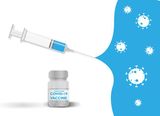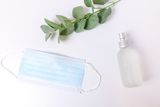Author: Rositsa Tashkova, Master of Molecular Biology and Microbiology
Steam inhalations have been a means of alleviating conditions such as runny nose, bronchitis, sore throat and cough since ancient times. The first people who are reported to have used inhalation as a remedy are Egyptians.
Even steam inhalations with pure or salted water only may provide relief [ref.1]. Most inhaled microorganisms and particles fail to reach peripheral airways - they get stuck in a mobile layer of mucus secretions covering the upper respiratory tract. This is followed by mucociliary clearance, i.e. secretion and cilia movements of the respiratory epithelium, which return pathogens and contaminants back out through coughing and runny nose.
Steam inhalation supports this process and moisturizes the airways, which leads to relief. When herbs are added to the inhalation solution, they can have a therapeutic effect locally in the airways, as their healing substances are contained in the aerosols that are inhaled.
In this article, we will focus on herbs that are suitable for steam inhalation in infectious diseases of the respiratory tract and anxiety.
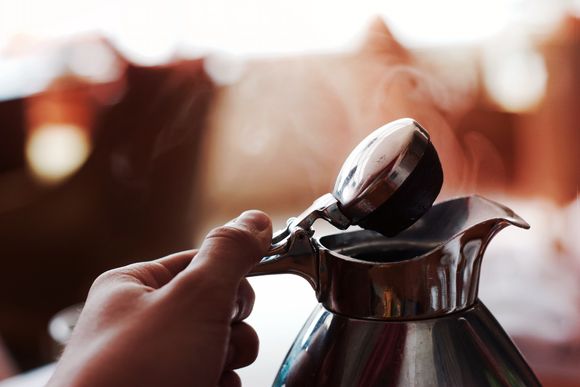
How to do steam inhalation at home
Steam inhalation is very easy to perform at home and with handy means, although special inhalers are also sold, which have both advantages and disadvantages.
Steam inhalation with handy means is done by boiling water in a kettle or saucepan. Herbs, essential oils, salt or baking soda are added to the water. It is good to check in advance whether you are allergic to the herb or essential oil that you intend to use.
Let the herbs boil for a few minutes and move the container from the heat, wait for the temperature to become tolerable, and only then proceed to inhale the vapor.
This can be done by covering the head and vessel with a cloth, so as not to lose the steam, as well as with inhalation through a funnel, but with caution to avoid burning the mucous membranes (the funnel creates a concentrated jet that may be too hot).
team inhalation is done no more than 10 minutes.
Steam inhalation is not advisable for children up to 12 years, due to the risk of burning.

The difference between inhalers and inhalation with handy means
Inhalers are safe in terms of temperature - they maintain a vapour temperature of about 40 degrees, thus eliminating the risk of burning the mucous membrane that exists when inhaling over a saucepan or kettle.
But it is not appropriate to put essential oils or herbal infusions in inhalers, since they emit much smaller particles (under 10 microns) than in ordinary inhalation, and this creates a risk of the substances getting too deep into the respiratory system - this is undesirable.
Inhalers can be used to take certain inhalation drugs prescribed by a doctor, which is not possible by simple inhalation.

Herbs that are suitable for inhalation at home
Steam inhalation can be used for various purposes and to alleviate a variety of inconveniences - runny nose, stuffy nose, insomnia and anxiety, in chronic obstructive pulmonary disease, for expectoration, for prevention. But this method usually shows the best results when combined with conventional treatment for more serious diseases.
Here are the most suitable herbs for steam inhalation:
- Chamomile (Matricaria chamomilla) - has an anti-inflammatory and sedative effect; it has been found that inhalation with chamomile essential oil lowers the anxiety of patients before unpleasant medical procedures [ref.2]; use 3-10 g of herb per 100 ml of water.
- Thyme (Thymus vulgaris) - it promotes liquefaction of secretions (expectorant) and has a calming and antibacterial effect; according to a 2020 study, thyme inhalations are very suitable for patients on mechanical respiration, as it improves their lung status [ref.3].
- Tea tree (Melaleuca alternifolia) - tea tree essential oil has an antibacterial and antifungal effect; according to a 2016 study in rats, inhalation with nanoparticlated essential tea tree oil is an effective means of combating bacterial and fungal pneumonia [ref.4], but it is necessary to approach it with caution when using tea tree oil for inhalation, since inhaling vapors with high concentration can lead to headache, vertigo and nausea.
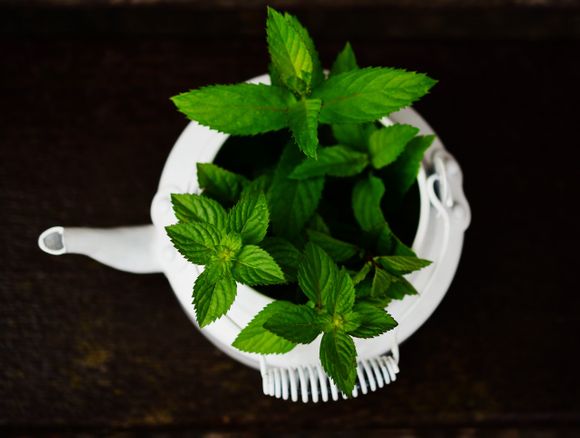
- Rosemary (Rosmarinus officinalis) - it has anti-inflammatory properties and has antibacterial and antiviral effect; a 2013 study has proven that rosemary stimulates the activity of the nervous system and leads to a feeling of freshness and vigor [ref.5].
- Basil (Ocimum basilicum) - is believed to have anti-inflammatory and sedative action; according to a 2019 study on mice, water-ethanol basil extract may be helpful for asthma sufferers [ref.6].
- Mint (Mentha piperita) - according to a 2020 study on mice, inhalations with mint can also improve the condition of asthma sufferers [ref.7].
- Eucalyptus - its main component, 1,8-cyneol, has antimicrobial effects against many bacteria, including the causative agent of tuberculosis Mycobacterium tuberculosis and methicillin-resistant Staphylococcus aureus (MRSA), viruses and fungi (including Candida). It also has immunostimulatory, anti-inflammatory, antioxidant, analgesic and antispasmodic effects [ref.8].
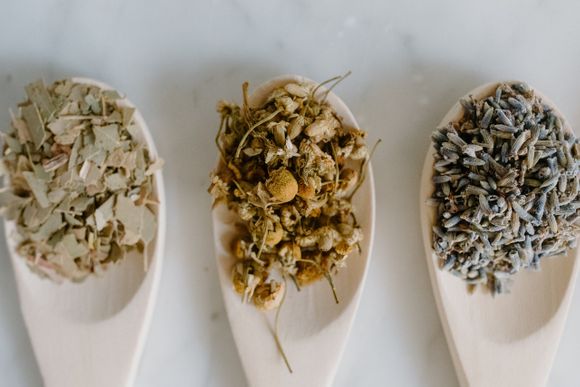
Inhalation is a relatively safe, accessible and effective method of dealing with a number of cold-related disorders, but also with your emotional state. There are many suitable herbs that possess antibacterial, anti-inflammatory and soothing effect.
In addition to medicinal purposes, inhalation can also be used for prevention or refreshment, as well as for cleansing the skin of the face. Why not set up a home spa? ;)



